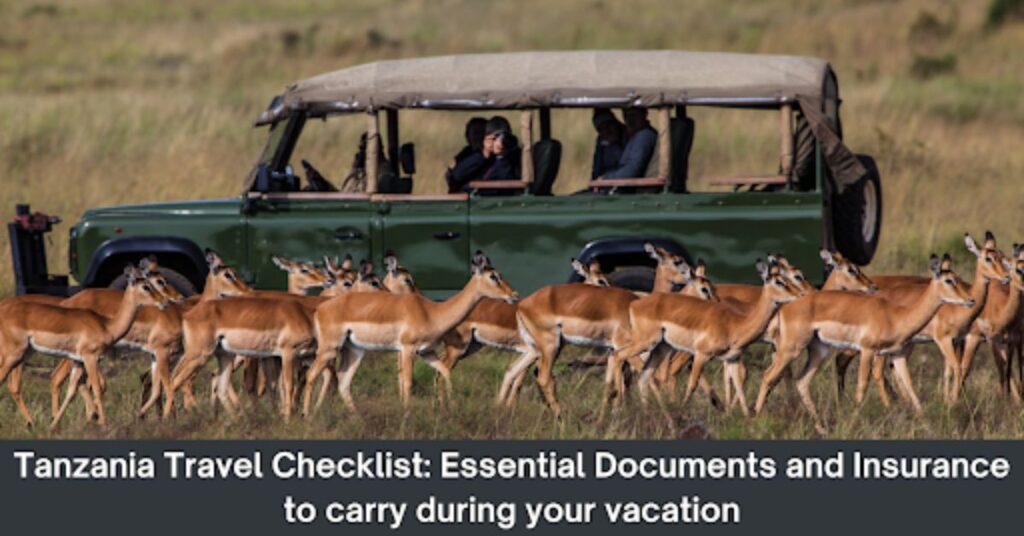Are you worried about the logistics of traveling to Tanzania, like what documents you’ll need, how to stay safe during your safari, or whether you have the right insurance coverage? As the safari market in Tanzania is projected to grow steadily and reach nearly US$980 million by 2029, it’s evident that more travelers are coming to experience its unforgettable wildlife and landscapes. Whether you’re embarking on an adventurous safari, exploring Zanzibar’s vibrant streets, or relaxing on the beach, proper preparation is key. The following blog will lead you through essential travel documents, insurance options, and more tips to make your Tanzanian adventure seamless and stress-free.
Plan Your Tanzania Safari
Tanzania is one of the world’s best safari destinations, from the great Serengeti plains to the iconic Ngorongoro Crater. Whether you’re searching for the “Big Five” or just looking to connect with nature, planning your Tanzania safari is a bucket-list experience. But before you embark on this life-changing adventure, ensuring you have all the necessary documents and the right insurance coverage is very important. Make sure you have the right documentation and preparation to ensure a safe trip so that you can enjoy the beauty and excitement that affordable Tanzania tour packages offer.
Essential Documents for Traveling to Tanzania
1. Passport Conditions
Make sure you carefully meet these prerequisites for your passport before making travel arrangements:
- Validity: Your passport must have a six-month validity after your intended departure from Tanzania.
- Blank Pages: You require at least two blank pages in your passport for entry and exit stamps.
It’s also a good idea to carry both a hard copy and a digital copy of your passport in case of emergencies. Secure the digital copy in any cloud storage, such as Google Drive.
2. Visa Requirements
A visa is essential for the majority of tourists traveling to Tanzania. This method will help you acquire it:
- Common Types of Visas: These include tourist, business, and transit visas.
- Application Process: You may apply for an eVisa from the official Tanzania Immigration website, or collect your visa at major entry points.
- Processing Time and Fees: Most eVisas are processed within 2–3 working days, but the duration may vary based on nationality and visa type.
3. Vaccination and Health Documentation
Health safety is a must while traveling to Tanzania. Prepare the following:
- Yellow Fever Certificate: It is mandatory to submit a yellow fever certificate for yellow fever vaccination for visitors coming from countries with a high risk of yellow fever transmission.
- COVID-19 Requirements: Ensure compliance with the latest vaccination or testing protocols.
- Routine Vaccinations: Hepatitis A, Typhoid, and prophylaxis of Malaria are highly recommended.
4. Flight Tickets and Itinerary
Print and digitize your flight tickets along with your travel itinerary. An immigration officer could demand a return or onward travel ticket as proof of your plans. This could indeed save some time when arriving by air since you have all the documents ready and it can help avoid unnecessary delays. There are quite a few small steps that bring you closer to success when entering Tanzania by air, especially when facing the complicated questions surrounding entry into a country, such as with customs or immigration.
5. Copies of Critical Documents
Equip multiple copies of all important travel documents to avoid losing them through theft or loss. These include:
- Passport and visa.
- Travel insurance policy.
- Hotel reservations and activity bookings.
Keep one in a safe place, for example, a hotel safe, and the other in a waterproof pouch for secure keeping when you do outdoor safaris. Use a secure cloud storage service such as Google Drive or Dropbox to store digital copies, so that you can have access to them anytime, anywhere you travel.
Securing the Right Travel Insurance for Tanzania
1. Why Travel Insurance Is Essential
Tanzania is indeed breathtaking, but risks such as illness, accidents, or trip cancellations can happen. Travel insurance typically covers:
- Medical Emergencies: Healthcare can be very expensive for travelers, particularly in remote safari regions.
- Adventure Risks: Safaris and other outdoor adventures carry unique risks.
- Trip Cancellations/Delays: Protect your investment if your trip is disrupted for reasons beyond your control.
2. Types of Travel Insurance
Choose the right plan based on your needs:
| Coverage Type | Features | Ideal For |
| Comprehensive Plans | Covers medical emergencies, cancellations, delays, and theft. | General travelers seeking full protection. |
| Safari-Specific Insurance | Includes coverage for wildlife-related incidents and remote evacuation. | Safari-goers and adventure seekers. |
| Medical Evacuation Plans | Covers emergency evacuation to nearby countries with advanced healthcare facilities. | Those exploring remote safari lodges. |
Recommended Providers: Check out World Nomads, Allianz Travel, and GeoBlue for reliable African travel insurance options.
3. Key Factors to Look For
When selecting travel insurance, prioritize:
- Medical Coverage: Ensure it includes evacuation costs.
- 24/7 Support: Assistance is crucial in remote locations.
- Claim Processes: Look for straightforward reimbursement policies.
Practical Tips for Staying Organized
1. Document Security
While you’re on safari or by the beaches in Tanzania, carry all your important papers with you in waterproof pouches to prevent damage from moisture or accidental splashes. Also, be prudent enough to store different sets of photocopies separately one in your hotel’s safe and another with your traveling buddy so if anything gets misplaced you will at least not face inconvenience.
2. Handling Currency and Payments
The Tanzanian Shilling (TZS) serves as the official currency of Tanzania, although in many tourist zones, US dollars are generally accepted. It is wise to keep some small denominations of both currencies for minor purchases such as tips or incidental spending. Notify your bank about international travel to avoid problems using cards or blocking accounts. Credit and debit cards are widely usable around town but you should carry cash for little remote areas that might not accept card payments at all.
3. Health and Safety Precautions
Packing for health mentally sure you pack all prescribed medicines and have a tiny kit of first-aid. like pain relievers antiseptics, and band-aids. Check for vaccination with all vaccines in place, including Anti-hepatitis A and malaria prevention, before traveling to Tanzania. Ensure that the travel insurance covers all the destinations where you plan to visit, especially if you intend to take an exciting safari or hiking.
Wrap-Up: Ensuring a Smooth Travel Experience
Have your papers ready, have good insurance, and follow these really useful tips. Everything that will turn your dream location into a reality easy and enjoyable vacation in Tanzania is in place. Now, dive into all the fantastic experiences Tanzania offers—from the wildlife-rich Serengeti to the serene beaches of Zanzibar—and enjoy the journey of a lifetime.
FAQs on the Travel Checklist
What are the most important documents that I need for entry into Tanzania?
You will need a valid passport, visa, Yellow Fever vaccination certificate required, and proof of travel insurance.
Do I need special safari traveling insurance?
Yes, many insurance providers offer safari-specific coverage that includes wildlife-related risks and emergency evacuations.
How do I apply for a Tanzania visa, and how long does it take?
You can apply for an eVisa from the Immigration Website of Tanzania; this takes 2-3 working days.
What colors to wear on safari in Tanzania?
When you are on a safari, it is better to wear neutral colors like beige, khaki, or olive. These are the colors that will blend with the environment and will not attract insects as would brighter hues. Avoid dark colors – especially black, because they attract a lot of heat and insects.







